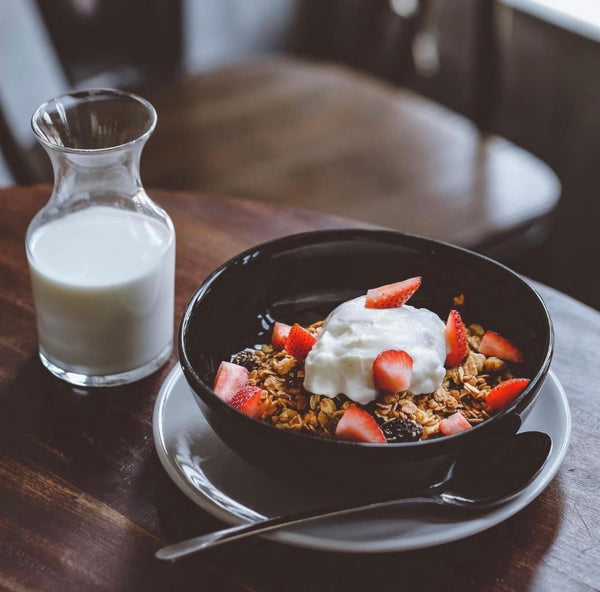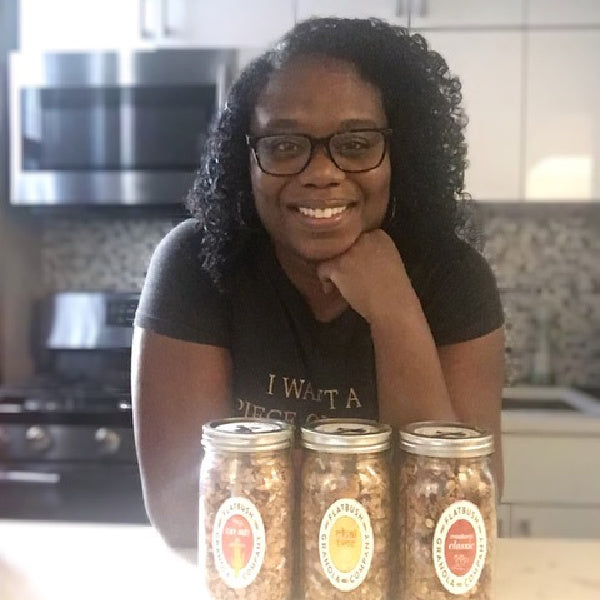Photographs courtesy of Flatbush Granola
Tracey Solomon is one of the many faces of Black entrepreneurship in America, one that reflects the determination, flexibility, and perseverance that small businesses need to succeed.
For years now, Black women have been creating their own businesses faster than any other racial or ethnic cohort. Between 2002 and 2012, the number of businesses created by Black women increased 179%, compared with 52% for all women-owned businesses and 20% for businesses overall.
Solomon moved to New York City from Canada in the early aughts to pursue a career in marketing and communications; but when she got her residency secured, she realized she could — and wanted to — go out on her own.
Before she became a cereal entrepreneur with Flatbush Granola, she was already a serial entrepreneur, working as a consultant for other start-up and established businesses, primarily shaping and then managing their communications and marketing strategies. Solomon knew the ins and outs of business building and brand creation; when a granola start-up essentially landed in her lap, she was poised better than most to turn it into a success. But then the pandemic happened.
Please read on for more about Solomon’s journey, and her audacious pivot, right at the start of lockdown.
NEW YORK MAKERS: First things first. How does a marketing pro become a granola maker?
TRACEY SOLOMON: Growing up, my mom didn’t want my sister and brother and me to eat the sugary, adorned cereals like Fruit Loops or Frosted Flakes. Instead, we ate Shredded Wheat, Muesli, and Cream of Wheat, so sugar levels could be controlled. But my parents, who are both West Indian, loved food. We grew up with all kinds of flavors and dishes, and we added spices and other fun things to our Cream of Wheat. My siblings and I are all very interested in food and cook all the time. My sister Resa actually has a café in Canada focused on Caribbean food, and it’s all gluten-free with vegan options, even though she isn’t. We all enjoy healthy food, full of flavor. But it’s true that I didn’t go to school to become a chef. My love of granola came from my best friend, who got me hooked on this super expensive artisanal granola, so I decided I had to make my own. It became a hobby, but then one year at Christmas, I completely forgot to buy gifts for my clients, and I went into crisis mode. I decided I’d make a big batch of granola, put it in cute mason jars, tie it with a beautiful ribbon, and hope for the best.

NYM: I’m guessing it wasn’t a problem.
TS: They loved it! They actually started harassing me to make more when they ran out. Then in the fall of 2019 my best friend was visiting me, and she was hungry, but I didn’t really have much to feed her. I gave her some of my granola, and she completely freaked out. She convinced me into turning it into a business.
NYM: So that was that?
TS: Not exactly. I’ve always done my own projects on the side, in addition to being a consultant. I helped my sister launch her business, and I even tried to launch my own subscription box way back in 2000, well before it became a thing. Obviously, that one didn’t work out. I knew that I couldn’t dump everything into the business immediately without taking on massive risk. I was planning on starting really small. But then in November, my sister asked me to do a stall for her at a pop-up food market in Brooklyn. When she found out she couldn’t get everything together in time, I felt terrible backing out, so I asked the organizers to swap in my granola.
NYM: This was a month later, right? Did you have everything in place? The license, the branding?
TS: No! That was the biggest issue. I told myself that if I couldn’t get my food license quickly, I’d back out. I knew I could do the branding, because I had an idea for the logo and I’ve guided so many clients through the process, I knew what to do. But I was able to get the license in two days, which was shocking. The short window really motivated me. Then, I invested in a really nice printer and figured out how to fit the logo and everything we needed for the labeling, including the nutrition content, into a printable label. Then it was just a matter of time, cooking and packaging. It’s amazing what you can do on the Internet. That was one of my biggest takeaways from this process. I did everything to create my entire product from my desk and my home kitchen.
NYM: Did you at least have your recipes down pat?
TS: No, that was the other issue. At that point, I just made one granola, the Cranberry Classic. I realized I needed more options, so I started experimenting, and using my friends as testers. Now, I have four regular granolas: Chai Time, Cranberry Classic, Fall Back, and Say Olé! I love all of them, and they all have been received very well.

NYM: How did the market go?
TS: It was phenomenal. I sold almost all of my 250 packages, and I loved interacting with the people. It was so fun to see their reactions and make a personal connection. I decided that was how I was going to build this. I’d do markets; I’d talk to people. It would be a slow build.
NYM: But then COVID.
TS: Yes. Just as I was building momentum and getting into more markets, the city was shut down. I realized all of my resources had to go to the website.
NYM: You already had the website I’m guessing.
TS: Yes. Then it was just a matter of getting the word out there on social media. I was building an audience, but what really made a difference honestly was Black Lives Matter. People truly realized that they wanted to support Black entrepreneurs. And we began supporting each other. We’d tag each other in posts, and it became a community. People couldn’t interact in person, so the market came to Instagram. And it’s interesting, because the subscription box thing came full circle. The first box I landed in was 500 packages. It was the Hopebox. Then others started coming in. I had to move out of my kitchen and into a commercial kitchen. Then, I was asked to do the VIP swag bag for the Prospect Park Gala, and the business really took off.

NYM: What’s next?
TS: I’m going to keep going. Thanks to virtual markets like New York Makers, which I joined in December, just in time for Christmas, and these subscription boxes, I’ve built a virtual community that I feel connected to. I even had to hire someone part time. A wonderful young lady who lives in my building. I’d like to find a way to source more ingredients locally, like oats and cranberries, which are produced in New York. I do hope I can get out there more this year and interact with people face-to-face.

We hope so, too.


Leave a comment